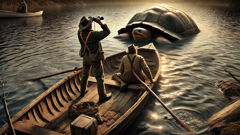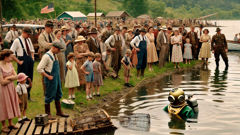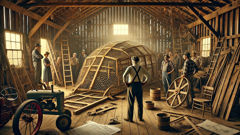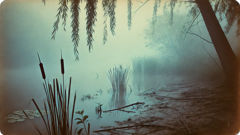Introduction
Before Oscar, Churubusco was just another name on the faded map of northeastern Indiana—a farming town stitched together by fields, family ties, and the quiet patience that comes from watching seasons wheel past. Fulk Lake, a small, muddy stretch of water pressed in by willows and cattails, had always been a place of whispered stories: the fishing was rumored to be good on foggy mornings, and herons sometimes stalked the shore, silent and ancient. Yet nothing in the quiet rhythm of 1940s Busco hinted at the storm of curiosity and obsession about to shake the town to its roots.
It started with rumors that felt as old as the land itself. Locals whispered about a shadow lurking beneath the surface—an ancient, armored turtle so vast it could carry a grown man on its back. For decades, these were just tales told after chores or on lazy afternoons at the gas station, the sort of legend you half-believe because the world feels smaller when you do. But in the spring of 1949, the lines between myth and reality began to blur. A respected farmer, Gale Harris, claimed he’d glimpsed the monster: a head the size of a football, jagged as a snapping turtle’s should be, eyes cold and curious, shell broad as a dinner table. Harris was no wild storyteller—his word carried weight, and suddenly, everyone in Churubusco had a cousin or neighbor who’d seen something move in those murky waters.
What followed was part fever dream, part small-town spectacle. Reporters flocked from Fort Wayne and Chicago, muddying their shoes along Fulk Lake’s banks. Camera crews lugged their gear past chicken coops and weathered barns. The town’s phone lines buzzed with calls from distant places, each one asking: was it true? Was there really a prehistoric beast hidden in the lake? By summer, Churubusco was transformed. Skeptics argued at the diner with true believers. Inventors and opportunists arrived with wild schemes—a diver with an old brass helmet, a homemade turtle trap big enough for a car, a circus agent offering cash for the capture. Fulk Lake became a stage, and Oscar, the Beast of Busco, was both monster and muse.
Yet beneath the laughter, excitement, and financial hope, something more ancient stirred. It was a sense of awe at nature’s mysteries, a reminder that even in places shaped by plows and fences, the wild could surprise you. The legend of Oscar was never just about a turtle. It was about the boundaries of belief, the power of story, and the stubborn possibility that the extraordinary might swim just beneath the surface—waiting to rise.
Rumor on the Water: The First Sightings
The earliest tales of Oscar drifted through Churubusco like woodsmoke—lingering, faint, impossible to pin down. In the years before World War II, fishermen sometimes spoke of an enormous shape gliding under their boats, stirring the lily pads with a wake too large for any common snapping turtle. Most laughed it off. Yet for a few, unease lingered.

It wasn’t until March 1949 that talk turned serious. Gale Harris and his friend Charlie Wilson were out on Fulk Lake, untangling lines in the weak spring sunlight. Harris, a man more comfortable with his tractor than tall tales, suddenly froze. In the shallow water near the bank, something vast shifted—a mottled shell surfaced for a heartbeat, then slipped away. "It was like looking at a submerged dining room table," Harris would say later, and his eyes, usually steady as the earth, flickered with something close to fear. He and Charlie rowed back to shore in silence, the air heavy between them.
When word reached the town, skepticism battled curiosity. Churubusco was a place where everyone knew everyone’s stories—and their secrets. But Harris’s reputation mattered. The next day, more men set out with binoculars, hoping for a glimpse. By week’s end, three separate groups claimed to have seen Oscar. A fisherman swore his oar bounced off something hard. Two boys playing hooky on the banks said they saw a monstrous head rise and blink at them before vanishing in a swirl of mud. In the tavern, arguments flared: was it just a trick of light, or had something primeval really made its home in Fulk Lake?
As the story spread, so did the visitors. Outsiders began to appear—reporters from the Fort Wayne Journal-Gazette scribbling notes, a biologist from Purdue University with a battered notebook, a local radio man hoping for a scoop. The town’s population seemed to double overnight. The Harris farm, which backed onto the lake, became a kind of base camp. Cars parked along the dirt road, their tires sinking in mud. Families picnicked in the grass, binoculars and cheap cameras at the ready. The local diner served up more coffee than it had in years.
Among the townsfolk, opinions split. Some hoped the legend would bring fortune—a boost for local business, maybe even national fame. Others worried about the disruption, the prying eyes, the trampling of fields. Children took to daring each other to swim out past the reeds. Old men sat by the water with pipes clamped in their teeth, keeping silent vigil as dusk fell. The church ladies prayed for peace, while teenagers whispered about Oscar in the dark, half afraid, half thrilled.
But all agreed on one thing: something had changed. The lake, once just another part of everyday life, had become a place of mystery and possibility. And in Churubusco, the ordinary world had grown just a little bit stranger.
The Frenzy: Churubusco on Parade
By late April 1949, Churubusco was no longer just a sleepy farm town. Word of Oscar had traveled farther than any local dared dream—or dread. Newspapers dubbed him “The Beast of Busco,” and stories about the giant turtle ran alongside headlines about the Cold War and baseball scores. The Harris farm became a hub of wild invention and stubborn hope, drawing crowds that sometimes numbered in the hundreds.

With each passing week, the hunt for Oscar became both more elaborate and more desperate. Local hardware stores sold out of rope and chicken wire. A diver from Fort Wayne arrived in an ancient, brass-helmeted suit, his presence as much spectacle as strategy. He waded into Fulk Lake, trailing hoses and wires, vanishing into brown water while children dared each other to get closer. He emerged shivering and empty-handed, swearing he’d felt something brush his boot but unable to prove it.
Gale Harris, determined to show the world what he’d seen, built a turtle trap the size of a small car. It was fashioned from salvaged lumber, metal mesh, and every bit of rural ingenuity he could muster. The contraption creaked ominously as it was lowered into the lake. Onlookers clustered on the shore for hours, whispering excitedly each time the water rippled or a frog croaked nearby. But day after day, the trap surfaced empty—except for snapping turtles no larger than dinner plates and the occasional unlucky muskrat.
The spectacle grew with every failed attempt. A circus promoter from Chicago appeared with a contract in hand, promising Harris riches if he could deliver Oscar alive. Local restaurants offered “turtle burgers” and “Oscar sundaes.” The schoolchildren made drawings of the beast, their imaginations transforming Oscar into everything from a dinosaur to a benevolent dragon. The town’s annual festival was hastily renamed “Turtle Days,” complete with games, parades, and a pageant to crown a Turtle Queen.
For some, the legend became a source of tension. Farmers worried about trampled crops and trespassing strangers. The Harris family faced lawsuits from neighbors angry about traffic and noise. Rumors swirled that Oscar was just a publicity stunt, or worse—a distraction from more pressing town troubles. Yet for every doubter, there were two believers, each with their own story of a ripple or shadow glimpsed in Fulk Lake.
As summer deepened, hope and obsession mingled in the humid air. Families picnicked on the banks, listening for the splash that would prove Oscar real. Inventors arrived with ever more outlandish devices: homemade periscopes, underwater microphones, even dynamite (quickly vetoed by the sheriff). A persistent group spent hours trying to drain part of the lake with a rented pump—only to have rain fill it back up within days.
In quieter moments, some wondered about the cost of chasing legends. The lake’s stillness became fraught with expectation; the natural world’s secrets were suddenly fodder for the evening news. Yet, underneath all the noise and spectacle, Oscar remained silent and unseen—his legend growing larger with each day he eluded capture.
The Chase: Obsession and Ingenuity
As July bled into August, Churubusco’s collective pursuit of Oscar took on the quality of both a comedy and a tragedy. What began as hopeful excitement had morphed into something bordering on mania—a community determined to prove to the world that its myth was real.

Gale Harris, who had once wanted only to farm his land in peace, became the reluctant general of this campaign. His barn was filled with blueprints for new traps and half-finished inventions: one was a floating cage with bait suspended from a winch; another involved lowering a cow’s head (already spoiled) as irresistible turtle bait—a scheme both gruesome and, ultimately, unsuccessful. By now, Harris was fielding daily calls from reporters as far away as New York and Los Angeles. He’d become the local celebrity everyone wanted to interview, and his farm—usually a sanctuary from the world—was now the epicenter of a national curiosity.
The townsfolk grew ever more creative and divided. Some staked out the lake overnight, armed with lanterns and thermoses of coffee. Others tried to map Oscar’s supposed routes by tossing floating markers—old bottles, painted bright red—into the water and watching for mysterious disturbances. A group of teens attempted to build a crude submarine from oil drums and scrap metal, nearly sinking themselves in the process. Each day brought new ideas and fresh disappointments.
Meanwhile, Churubusco itself changed under the pressure. Tourists arrived by the busload, filling up the handful of motels and guest rooms. Local businesses boomed: hardware stores, diners, and ice cream parlors sold Oscar-themed wares. The town’s high school band composed a “Turtle March” performed during parades. Yet not everyone was thrilled. Some locals, weary of trampled fields and lost privacy, hung signs warning visitors to keep out. Rumors of vandalism and theft began to circulate. Old resentments simmered beneath the town’s cheerful surface.
As for Oscar, he remained maddeningly elusive. Each failed capture attempt only deepened his legend. The press painted him as a cunning adversary—smarter than any trap, too powerful for mere mortals to snare. Some theorized he was an ancient survivor from a prehistoric age; others suggested he was a ghostly guardian of the lake. A few even whispered that Oscar had magical powers, able to vanish at will or bring luck to those who respected his domain.
In the late summer heat, Harris made one last grand effort. With money raised from donations and local business sponsors, he hired professional trappers from Louisiana—men who claimed to have caught gators twice Oscar’s size. They arrived with sturdy boats and heavy nets, their drawls thick with confidence. For three days, they scoured Fulk Lake from end to end. They found nothing but mud, leeches, and rumors.
As the final attempt ended in defeat, a strange calm settled over Churubusco. The circus had come and gone. Oscar—if he ever existed—was still free. But something had shifted in the hearts of those who waited by the water: the thrill of possibility had given way to a gentler respect for the mysteries that remained. The beast in the lake had become a part of the town’s identity—not a prize to be caught, but a story to be cherished.
Conclusion
As autumn crept across Indiana, Fulk Lake quieted once more. The crowds thinned, leaving behind muddy footprints and a scattering of lost hats along the bank. The reporters packed up their notebooks, the divers hung up their suits, and the last turtle traps rusted gently in barns and sheds. Life in Churubusco returned to its slow, familiar pace—but something essential had changed.
Oscar was never captured, never photographed clearly, never displayed for all to see. Some called him a myth born of boredom and ambition; others insisted they’d glimpsed his armored back on misty mornings or heard his heavy splashes after dusk. To those who lived through that extraordinary summer, Oscar was more than a creature—he was a mirror reflecting both the longing for wonder and the deep-rooted pride of a small town united by hope.
Decades later, the legend lives on. Children paddle out on Fulk Lake, daring each other to reach the deepest spot. The annual Turtle Days festival still draws crowds from far and wide. Stories about Oscar grow with each telling, his size swelling in memory until he could swallow boats whole or carry away stray dogs. Yet beneath all the exaggeration lies a truth: for one unforgettable season, Churubusco believed in the impossible. In chasing Oscar, they found community, laughter, and awe—a reminder that nature’s mysteries can still ripple across even the most ordinary of lives.













